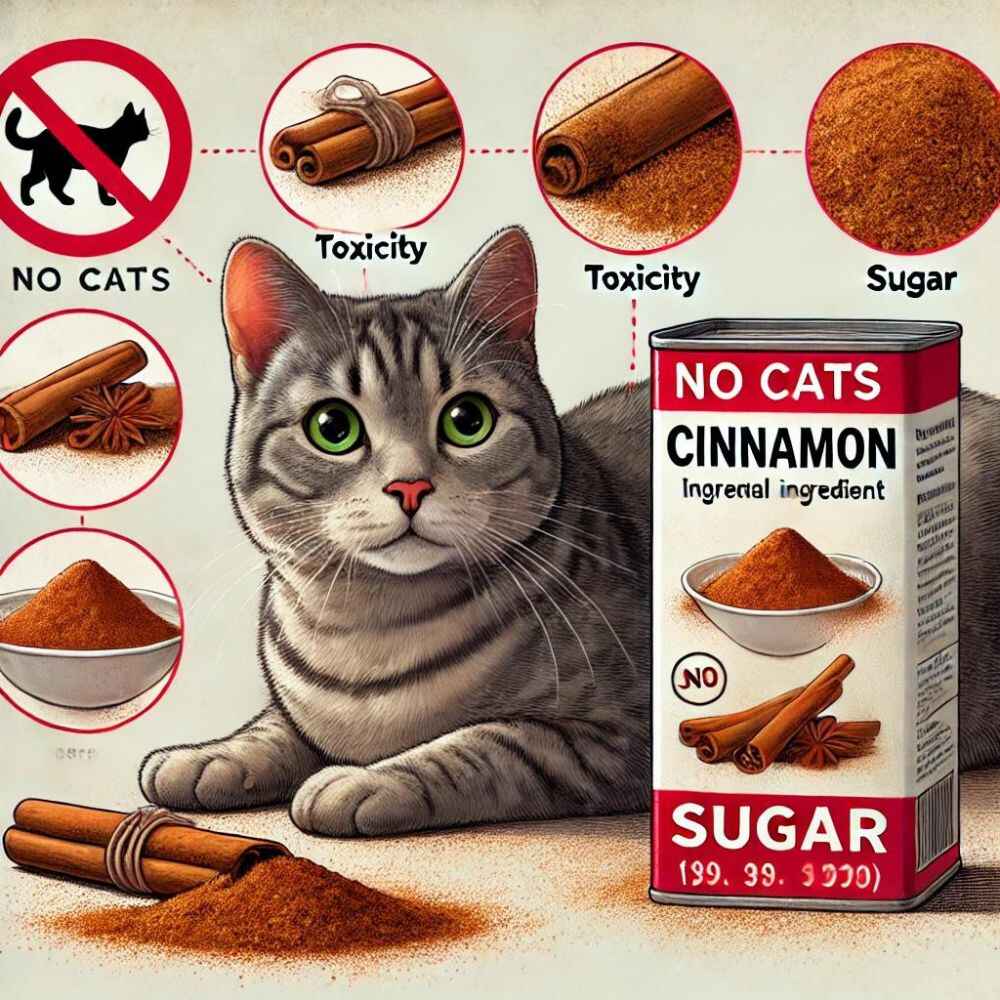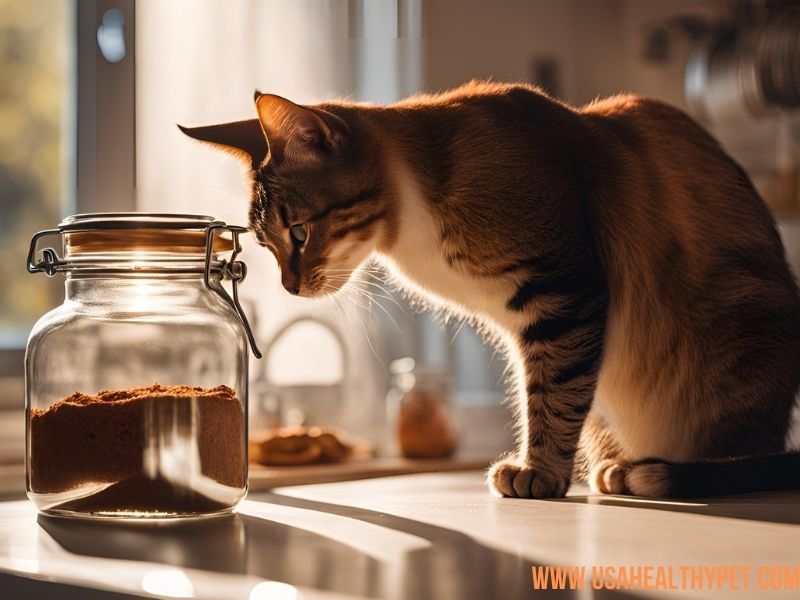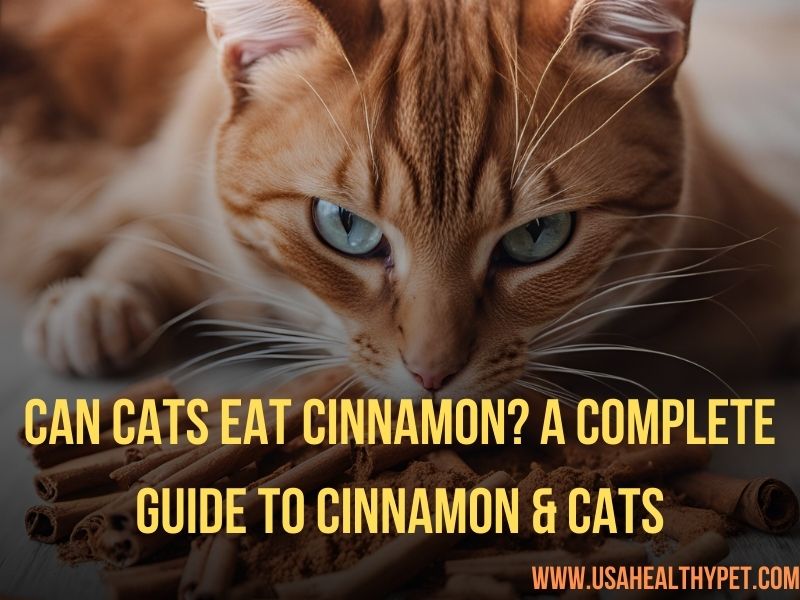Can cats eat cinnamon? Whether you’re baking at home or just enjoying a cinnamon-spiced snack, you might be curious if it’s okay for your cat to have a little taste.
Let’s dive into everything you need to know about cats and cinnamon.
What Is Cinnamon?
Cinnamon is a spice derived from the inner bark of trees, commonly used in cooking and baking to add warmth and flavor.
It’s found in many foods, from cinnamon rolls to breakfast cereals like Cinnamon Toast Crunch. While cinnamon is delightful for humans, things can be quite different for our feline companions.
Can Cats Eat Cinnamon?
The short answer? No, cats should not eat cinnamon. While cinnamon isn’t as deadly as chocolate or certain other foods for cats, it can still cause a lot of harm, especially if consumed in large amounts.
According to the ASPCA (American Society for the Prevention of Cruelty to Animals), cinnamon can be harmful to pets, including cats, if ingested in large amounts. While not as toxic as some foods like chocolate or onions, cinnamon contains compounds that are hard for cats to metabolize.
Cats have a much more sensitive system compared to humans, and certain substances that seem harmless to us can be problematic for them.
Do Cats Like the Smell of Cinnamon?
Do cats even like the smell of cinnamon? Some cats might be curious and sniff it out of curiosity, but many will avoid it.
Cats have a highly developed sense of smell, and some odors, like cinnamon, can actually be quite overwhelming to them. It’s not uncommon for cats to steer clear of strong spices, and cinnamon is no exception.

Is Cinnamon Safe for Cats?
While small amounts of cinnamon in the air or on surfaces might not be immediately dangerous to your cat, ingesting cinnamon is a different story.
Whether it’s powdered cinnamon, cinnamon oil, or even foods containing cinnamon, it’s best to keep them away from your feline friend.
Dr. Justine Lee, a veterinary toxicologist, points out that inhaling cinnamon powder can lead to coughing, wheezing, and difficulty breathing in cats. This is particularly risky if cinnamon is used in homes in powdered or essential oil forms.
Why Is Cinnamon Harmful to Cats?
Cinnamon contains a compound called coumarin, which can be toxic to cats if consumed in significant amounts.
Unlike humans, cats cannot metabolize this compound effectively, leading to symptoms like:
- Vomiting
- Diarrhea
- Rapid heart rate
- Low blood sugar
- Liver damage in severe cases
Additionally, cinnamon oil and other concentrated forms can cause skin irritation or even burns if applied topically or inhaled by your cat.
Can Cats Eat Cinnamon Rolls?
The answer is a firm no. Cinnamon rolls contain much more than just cinnamon. They are often packed with sugar, butter, and sometimes even raisins (which are highly toxic to cats).
The high-fat content, combined with the harmful effects of cinnamon, makes cinnamon rolls a no-go for your feline friend.
Can Cats Eat Cinnamon Toast Crunch?
What about the ever-popular Cinnamon Toast Crunch cereal? Surely a small bite of cereal isn’t so bad, right? Unfortunately, Cinnamon Toast Crunch is filled with sugar, artificial flavors, and cinnamon.
While a single accidental nibble likely won’t cause major harm, feeding your cat this cereal regularly is definitely not a good idea.
The sugar and cinnamon content alone can lead to digestive issues, and over time, your cat may experience more serious health problems like obesity or diabetes.

How to Keep Your Cat Safe Around Cinnamon
We love cinnamon in our homes, but it’s important to keep it away from your cat. Here are some tips:
- Store spices like cinnamon in sealed containers and out of your cat’s reach.
- Clean up any cinnamon spills immediately, especially if it’s on the floor or surfaces your cat might walk across.
- Avoid using cinnamon-scented candles or air fresheners if your cat seems sensitive to the smell.
Dr. Elizabeth Colleran, a board-certified feline veterinarian, advises that when introducing any new smell, food, or spice in your home, make sure it’s non-toxic and that you monitor how your cat reacts.
What Should You Do If Your Cat Eats Cinnamon?
If you suspect your cat has eaten cinnamon, it’s important to monitor them closely. A small lick or taste might not cause immediate symptoms, but larger amounts can be dangerous.
Look for signs such as vomiting, drooling, or changes in their breathing.
Common Symptoms of Cinnamon Toxicity in Cats
Here are some common symptoms of cinnamon toxicity to watch for:
- Vomiting and diarrhea
- Coughing or trouble breathing (especially if cinnamon powder was inhaled)
- Mouth or tongue irritation
- Low energy or lethargy
- Increased heart rate or low blood sugar
If your cat displays any of these symptoms, don’t wait. Contact your vet immediately for advice.
Are There Any Safe Spices for Cats?
While cinnamon is off-limits, some herbs and spices are safe (in small amounts) for cats. For example:
- Catnip: This is actually a favorite among most cats and is perfectly safe.
- Parsley: In small amounts, parsley can be a healthy treat for your cat.
- Thyme: Some cats enjoy the smell of thyme, and it’s safe for them in moderation.
However, it’s always best to consult with your vet before introducing any new food or spices to your cat’s diet.
Healthier Treats for Your Cat
If you want to spoil your cat with treats, stick to options specifically designed for them. You can also offer plain, cooked meats like chicken or turkey in moderation.
These are not only safe but also delicious for your feline friend. There are also many high-quality commercial cat treats available that cater to their specific dietary needs.
Conclusion
In summary, while cinnamon is a delightful spice for us humans, it’s not something you should share with your cat.
Whether it’s a cinnamon roll, cinnamon toast crunch, or even just a sprinkle of powdered cinnamon, it’s best to keep it away from your furry friend. Always prioritize your cat’s health and opt for cat-friendly treats instead.
If you suspect your cat has ingested cinnamon, it’s always best to consult your veterinarian. Keeping your home cat-proofed and avoiding harmful spices will ensure your feline stays happy and healthy.
